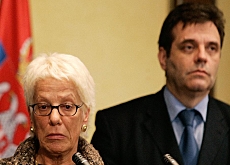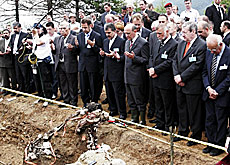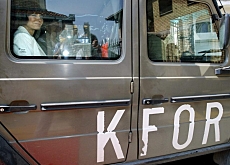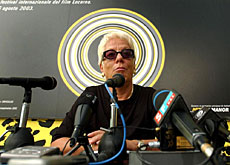Bosnia war crime suspects elude Del Ponte

Ten years after the Bosnian war, a leading political expert tells swissinfo how Switzerland's Carla del Ponte is doing as UN war crimes prosecutor.
Andre Liebich, professor of history and politics at the Graduate Institute of International Studies in Geneva, says Del Ponte’s mandate is difficult to reconcile with the demands of realpolitik in Bosnia.
Since her appointment in August 1999, Del Ponte has been trying to bring the Bosnian Serb wartime leaders Radovan Karadzic and Ratko Mladic before the United Nations war crimes tribunal in The Hague.
Her patience appeared to have snapped last month, when she bluntly told the UN Security Council that Bosnia and Serbia and the international community must share the blame for not having captured the tribunal’s two most-wanted fugitives.
Karadzic and Mladic are accused of orchestrating the 1995 massacre of 8,000 Muslim boys and men from Srebrenica and laying siege to the Bosnian capital of Sarajevo.
Del Ponte said there was “no political will” from local authorities or international forces in Bosnia who feared their capture could undermine stability.
swissinfo: Has Carla Del Ponte got a point?
Andre Liebich: She may have some of a point but not that much. She says there is no political will [to capture Karadzic and Mladic], but that can mean different things – that these presumed criminals are known to be somewhere and no one is willing to pick them up. I’m not sure that that’s the case.
She’s not concerned with politics or peace and reconciliation in the countries in which she’s dealing. That’s the attitude of the prosecutor – it’s her professional duty to think in these terms – but there are other people who have to weigh up the other factors.
swissinfo: Is she doing a good job?
A.L.: She’s pushing as a prosecutor would to round up the culprits and bring them to court, but she’s doing it with a lot of collateral damage. She’s already been removed from one case [Rwanda], probably under American pressure, and was asked to let reconciliation take its course there.
There’s also the question that Del Ponte doesn’t ask – because it’s not her job – [and that is] whether rounding up these people and sending them to The Hague is politically the best thing to do.
swissinfo: Is she up to the job?
A.L.: She can’t do anything to capture these people – I mean, she can’t go out into the countryside with a posse. She obviously doesn’t have great powers of persuasion because if she did she wouldn’t be appealing to outside opinion in the way she is.
Or perhaps that’s not her style. Perhaps she doesn’t try to negotiate with people responsible. She appeals to outside opinion to constrain and even sometimes humiliate political leaders.
swissinfo: Is Del Ponte running out of time?
A.L.: I don’t think there’s a statute of limitations on crimes of the sort of which they are accused but it hasn’t been an overwhelmingly convincing experience.
The idea behind international tribunals is that there are criminals, you capture them and you bring them to justice. These are cowboy movies! Things don’t work out that way outside Hollywood.
swissinfo: Does her Swissness play a role? Does Swiss neutrality count for anything?
A.L.: No. I think Switzerland has lost whatever neutrality it had in the Yugoslav affair with the sort of declarations that [the Swiss foreign minister] Micheline Calmy-Rey has made and Switzerland’s quite blatant support for one – most likely – but still one outcome in Kosovo (see related items). I don’t think Swiss neutrality is credible there.
I should hope that institutions like the Red Cross still have credibility in former Yugoslavia and elsewhere but I don’t think Switzerland is seen as a neutral and impartial actor – certainly not in Belgrade.
swissinfo: Should the Swiss government be putting more pressure on other governments?
A.L.: I don’t think so. International functionaries are not supposed to be beholden to the governments that nominated them or the countries which they came from.
It would be as improper for the Swiss government to rein Del Ponte in as to egg her on. She should be a neutral international party and if she ends up criticising the Swiss government that’s all within the acceptable limits of what she can say and do.
swissinfo-interview: Thomas Stephens
On July 11, 1995 Serbian soldiers and paramilitary forces massacred about 8,000 Muslims in the Bosnian town of Srebrenica.
The town was one of six “safe” zones created by the United Nations. Dutch forces in the UN peacekeeping mission were unable to prevent the massacre.
Since 1995, an international criminal tribunal in The Hague has charged 14 people with being responsible.
Carla Del Ponte, 58, was born in Lugano, Switzerland, and is currently chief UN war crimes prosecutor.
A lawyer by training, she has been an investigating magistrate as well as public prosecutor in Lugano and Swiss federal prosecutor.
In September 2007 Del Ponte’s second four-year term will end and the UN will decide whether to give extend her mandate for another four years.
She receives her salary from the UN, but the Swiss government contributes towards her security arrangements.

In compliance with the JTI standards
More: SWI swissinfo.ch certified by the Journalism Trust Initiative





You can find an overview of ongoing debates with our journalists here. Please join us!
If you want to start a conversation about a topic raised in this article or want to report factual errors, email us at english@swissinfo.ch.